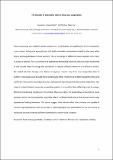The transfer of alternative tasks in reciprocal cooperation
Abstract
Direct reciprocity can establish stable cooperation. Nevertheless, the significance of this mechanism is yet unclear. A frequent assumption is that both commodity and context should be the same when help is exchanged between social partners. Yet, an exchange of different favours appears more likely in a natural setting. This is assumed to be cognitively demanding, however, because experienced help in one context needs to change the motivation to help by different means or in a different context. We tested whether Norway rats, Rattus norvegicus, transfer help from one cooperative task to another. Individuals could provide food to previously either cooperating or defecting partners by using a different mechanism to produce food for their partner than the partner had used to help them. Test subjects indeed helped previously cooperative partners more often than defecting ones by using a different provisioning mechanism. This implies that rats realize the cooperative propensity of social partners, which they consequently reward by help of a different kind; hence, they do not merely copy experienced helping behaviour. Our results suggest that animals other than primates are capable of transferring help between different contexts, which highlights new possibilities for the occurrence of reciprocal altruism involving different commodities and services in nature.
Citation
Schweinfurth , M K & Taborsky , M 2017 , ' The transfer of alternative tasks in reciprocal cooperation ' , Animal Behaviour , vol. 131 , pp. 35-41 . https://doi.org/10.1016/j.anbehav.2017.07.007
Publication
Animal Behaviour
Status
Peer reviewed
ISSN
0003-3472Type
Journal article
Description
Funding was provided by SNF-grant 31003A_156152 to M.T.Collections
Items in the St Andrews Research Repository are protected by copyright, with all rights reserved, unless otherwise indicated.

